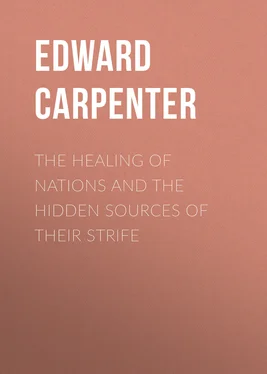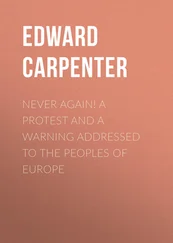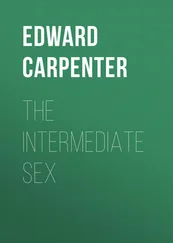Edward Carpenter - The Healing of Nations and the Hidden Sources of Their Strife
Здесь есть возможность читать онлайн «Edward Carpenter - The Healing of Nations and the Hidden Sources of Their Strife» — ознакомительный отрывок электронной книги совершенно бесплатно, а после прочтения отрывка купить полную версию. В некоторых случаях можно слушать аудио, скачать через торрент в формате fb2 и присутствует краткое содержание. Жанр: foreign_prose, История, foreign_edu, foreign_antique, на английском языке. Описание произведения, (предисловие) а так же отзывы посетителей доступны на портале библиотеки ЛибКат.
- Название:The Healing of Nations and the Hidden Sources of Their Strife
- Автор:
- Жанр:
- Год:неизвестен
- ISBN:нет данных
- Рейтинг книги:4 / 5. Голосов: 1
-
Избранное:Добавить в избранное
- Отзывы:
-
Ваша оценка:
- 80
- 1
- 2
- 3
- 4
- 5
The Healing of Nations and the Hidden Sources of Their Strife: краткое содержание, описание и аннотация
Предлагаем к чтению аннотацию, описание, краткое содержание или предисловие (зависит от того, что написал сам автор книги «The Healing of Nations and the Hidden Sources of Their Strife»). Если вы не нашли необходимую информацию о книге — напишите в комментариях, мы постараемся отыскать её.
The Healing of Nations and the Hidden Sources of Their Strife — читать онлайн ознакомительный отрывок
Ниже представлен текст книги, разбитый по страницам. Система сохранения места последней прочитанной страницы, позволяет с удобством читать онлайн бесплатно книгу «The Healing of Nations and the Hidden Sources of Their Strife», без необходимости каждый раз заново искать на чём Вы остановились. Поставьте закладку, и сможете в любой момент перейти на страницу, на которой закончили чтение.
Интервал:
Закладка:
By a curious fatality Germany has become the centre of this great war and world-movement, which is undoubtedly destined—as the Germans themselves think, though in a way quite other than they think—to be of vast importance, and the beginning of a new era in human evolution. And the more one considers Germany's part in the affair, the more one sees, I think, that from the combined influence of her historical antecedents and her national psychology this fatality was to be expected. In roughly putting together these antecedent elements and influences, I have entitled the chapter "The Case for Germany," because on the principle of tout comprendre the fact of the evolution being inevitable constitutes her justification. The nations cannot fairly complain of her having moved along a line which for a century or more has been slowly and irresistibly prepared for her. On the other hand, the nations do complain of the manner and the methods with which at the last she has precipitated and conducted the war—as indeed they have shown by so widely combining against her. However right, from the point of view of destiny and necessity, Germany may be, she has apparently from the point of view of the moment put herself in the wrong. And the chapter dealing with this phase of the question I have called "The Case against Germany."
Whatever further complications and postponements may arise, there will certainly come a time of recovery and reconstruction on a wide and extended scale over Europe and a large part of the world. To even outline this period would be impossible at present; but in the sixth chapter and the last, as well as in the intermediate pieces, I have given some suggestions towards this future Healing of the Nations.
The Evil—huge and monstrous as it is—is not senseless, one may feel sure. Even now here in England one perceives an extraordinary pulling together and bracing up of the people, a development of solidarity and mutual helpfulness, a greater seriousness, and a disregarding of artificialities, which are all to the good. These things are gains, even though the way of their manifestation be through much of enmity and ignorance. And one may fairly suppose that similar results are traceable in the other nations concerned. Wounds and death may seem senseless and needless, but those who suffer them do not suffer in vain. All these shattering experiences, whether in a nation's career or in the career of an individual, cause one—they force one—to look into the bases of life and to get nearer its realities. If, in this case, the experiences of the war, and the fire which the nations are passing through, serve to destroy and burn up much of falsity in their respective habits and institutions, we shall have to admit that the attendant disasters have not been all loss—even though at the same time we admit that if we had had a grain of sense we might have mended our falsities in far more economical and sensible fashion.
If in the following pages—chiefly concerned as they are with Germany and England—I have seemed to find fault with either party or to affix blame on one or the other, it is not necessary to suppose that one harbours ill-feeling towards either, or that one fails to recognize the splendid devotion of both the combatants. Two nations so closely related as the Germans and the English cannot really be so hopelessly different in temperament and character; and a great deal of the supposed difference is obviously artificial and class-made for the occasion. Still, there are differences; and as we both think we are right, and as we are unable to argue the matter out in a rational way, there seems to be nothing for it but to fight.
War has often been spoken of as a great Game; and Mr. Jerome K. Jerome has lately written eloquently on that subject. It is a game in which the two parties agree, so to speak, to differ. They take sides, and in default of any more rational method, resort to the arbitrament of force. The stakes are high, and if on the one hand the game calls forth an immense amount of resource, skill, alertness, self-control, endurance, courage, and even tenderness, helpfulness, and fidelity; on the other hand, it is liable to let loose pretty bad passions of vindictiveness and cruelty, as well as to lead to an awful accumulation of mental and physical suffering and of actual material loss. To call war "The Great Game" may have been all very well in the more rudimentary wars of the past; but to-day, when every horrible invention of science is conjured up and utilized for the express purpose of blowing human bodies to bits and strewing battlefields with human remains, and the human spirit itself can hardly hold up against such a process of mechanical slaughter, the term has ceased to be applicable. The affections and the conscience of mankind are too violently outraged by the spectacle; and a great mass of feeling is forming which one may fairly hope will ere long make this form of strife impossible among the more modern peoples.
Still, even now, as Mr. Jerome himself contends, the term is partly justified by a certain fine feeling of which it is descriptive and which is indeed very noticeable in all ranks. Whether in the Army or Navy, among bluejackets or private soldiers or officers, the feeling is certainly very much that of a big game—with its own rules of honour and decency which must be adhered to, and carried on with extraordinary fortitude, patience, and good-humour. Whether it arises from the mechanical nature of the slaughter, or from any other cause, the fact remains that among our fighting people to-day—at any rate in the West—there is very little feeling of hatred towards the "enemy." It is difficult, indeed, to hate a foe whom you do not even see. Chivalry is not dead, and at the least cessation of the stress of conflict the tendency to honour opponents, to fraternize with them, to succour the wounded, and so forth, asserts itself again. And chivalry demands that what feelings of this kind we credit to ourselves we should also credit to the other parties in the game. We do cordially credit them to our French and Belgian allies, and if we do not credit them quite so cordially to the Germans, that is partly at least because every lapse from chivalrous conduct on the part of our opponents is immediately fastened upon and made the most of by our Press. Chivalry is by no means dead in the Teutonic breast, though the sentiment has certainly been obscured by some modern German teachings.
While these present war-producing conditions last, we have to face them candidly and with as much good sense as we can command (which is for the most part only little!). We have to face them and make the best of them—though by no means to encourage them. Perhaps after all even a war like the present one—monstrous as it is—does not denote so great a deviation of the old Earth from its appointed orbit as we are at first inclined to think. Under normal conditions the deaths on our planet (and many of them exceedingly lingering and painful) continue at the rate of rather more than one every second—say 90,000 a day. The worst battles cannot touch such a wholesale slaughter as this. Life at its normal best is full of agonizings and endless toil and sufferings; what matters, what it is really there for , is that we should learn to conduct it with Dignity, Courage, Goodwill—to transmute its dross into gold. If war has to continue yet for a time, there is still plenty of evidence to show that we can wrest—even from its horrors and insanities—some things that are "worth while," and among others the priceless jewel of human love and helpfulness.
II
WAR-MADNESS
September , 1914.
How mad, how hopelessly mad, it all seems I With fifteen to twenty million soldiers already mobilized, and more than half that number in the fighting lines; with engines of appalling destruction by land and sea, and over the land and under the sea; with Northern France, Belgium, and parts of Germany, Poland, Russia, Servia, and Austria drenched in blood; the nations exhausting their human and material resources in savage conflict—this war, marking the climax, and (let us hope) the finale of our commercial civilization, is the most monstrous the old Earth has ever seen. And yet, as in a hundred earlier and lesser wars, we hardly know the why and wherefore of it. It is like the sorriest squabbles of children and schoolboys—utterly senseless and unreasoning. But broken bodies and limbs and broken hearts and an endless river of blood and suffering are the outcome.
Читать дальшеИнтервал:
Закладка:
Похожие книги на «The Healing of Nations and the Hidden Sources of Their Strife»
Представляем Вашему вниманию похожие книги на «The Healing of Nations and the Hidden Sources of Their Strife» списком для выбора. Мы отобрали схожую по названию и смыслу литературу в надежде предоставить читателям больше вариантов отыскать новые, интересные, ещё непрочитанные произведения.
Обсуждение, отзывы о книге «The Healing of Nations and the Hidden Sources of Their Strife» и просто собственные мнения читателей. Оставьте ваши комментарии, напишите, что Вы думаете о произведении, его смысле или главных героях. Укажите что конкретно понравилось, а что нет, и почему Вы так считаете.












